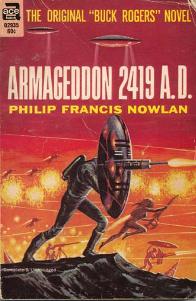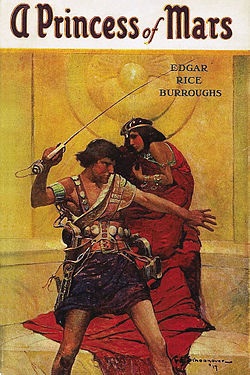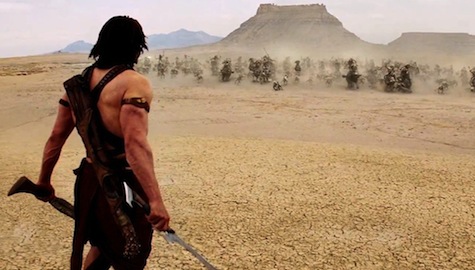In one month, on the centennial of the publication of Edgar Rice Burroughs’ first short story “Under the Moons of Mars,” the film John Carter will see one of the oldest science fiction protagonists returning to mainstream culture. But does mainstream culture know who this John Carter guy is? How many are aware he is immortal? A Confederate solider? A failed gold prospector? Chances are most people know none of this, nor are they aware that this action-flick complete originates from Edgar Rice Burroughs, who also happens to be the inventor of Tarzan. Further, does everyone know Hugo Award and Pulitzer Prize famed author Michael Chabon is a screenwriter for the film?
Assuming most people know none of this, who exactly is the John Carter movie for? And what does it say about how the zeitgeist really regards classic pulp heroes?
The discussion of John Carter creates a nice absence of “I remember when” snobbery insofar as the first story is 100 years old. Meaning, like Doyle’s Sherlock Holmes, not only has most of the prose passed into the public domain, but also the scholarship and criticism of this kind of work is similarly available to anyone who is interested.
In the books, John Carter is an immortal man who has seemingly always been 30 years old. He was a Confederate soldier who, after the war, tried to do some gold prospecting with a guy named James K. Powell. After Powell disappeared, John Carter went looking for him, hoping that the Apaches didn’t scalp his buddy. After entering a cave, John Carter bizarrely finds himself on the planet Mars. Because the gravity is different, JC discovers he has superhuman (and super-Martian!) powers of strength and agility. In this way, he’s a lot like everyone’s favorite orphan of Krypton: Superman.
The notion of someone coming from another planet, time, or dimension to an “alien” setting and acquiring superhuman powers because of the change of scenery seems to originate with the first John Carter story. But, this conceit is made all the more strange by the fact that John Carter was already immortal BEFORE the mysterious transportation from Earth to Mars. This is pretty complicated stuff for mainstream fiction stories written 100 years ago. John Carter had a science fiction background before the science fiction stuff starts happening to him.
Like Captain Jack Harkness of Doctor Who and Torchwood there’s more than one layer of weird going here. It’s not enough that Jack is immortal, but he’s also from the far-future AND another planet, even though Rose and the Doctor first meet him in WWII. For a 2005 audience, this is stuff non-science fiction fans can barely follow. John Carter’s similarities to Jack are striking not only because of the military service, but also the multiple layers of science fiction conceits.
This layering is interesting, because often when a new otherworldly element is added onto something already fantastical, it is perceived as overkill. For example, everyone hated it when Highlander 2 depicted Macleod and Ramirez not only as immortals but then retroactively as aliens from Planet Whatever. But maybe the screenwriters didn’t make a mistake. Maybe they were just paying homage to the roots of stories about immortals wielding swords against evil. (For further Highlander/ John Carter connections, consider this: Christopher Lambert’s first breakout film was Greystroke: The Legend of Tarzan. And we all know who came up with Tarzan!)
 Another example of a fish-out-of water character becoming a science fiction hero is found in the 1928 Philip Francis Nowlan novel Armageddon 2419 A.D. This one gave the world the character of Anthony “Buck” Rogers who, like John Carter, also had a strange experience in a cave, one that knocked him out for several centuries only to wake-up in the 25th century. Again, parallels to John Carter are prevalent with Buck. He’s kind of immortal owing to his advanced age combined with youthfulness and he’s bringing his old-world sensibilities to an alien one in heroic fashion. Buck Rogers, Captain Jack Harkness, and Superman, all discover that the world/time they find themselves in needs them in ways the world they came from doesn’t or can’t. And John Carter is the original gangsta of this premise. But if that’s true, how come no one’s heard of him?
Another example of a fish-out-of water character becoming a science fiction hero is found in the 1928 Philip Francis Nowlan novel Armageddon 2419 A.D. This one gave the world the character of Anthony “Buck” Rogers who, like John Carter, also had a strange experience in a cave, one that knocked him out for several centuries only to wake-up in the 25th century. Again, parallels to John Carter are prevalent with Buck. He’s kind of immortal owing to his advanced age combined with youthfulness and he’s bringing his old-world sensibilities to an alien one in heroic fashion. Buck Rogers, Captain Jack Harkness, and Superman, all discover that the world/time they find themselves in needs them in ways the world they came from doesn’t or can’t. And John Carter is the original gangsta of this premise. But if that’s true, how come no one’s heard of him?
Yesterday, I asked the Tor.com Twitter and Facebook followers who they considered to be the most famous between John Carter, Buck Rogers, and Flash Gordon. Flash was first, Buck second, and poor JC was dead last by a lot. Now, it’s possible Flash’s popularity is totally attributed to having a Queen song written about him (thanks @bhalpin!) but there’s probably a better reason for JC to be so absent from the public consciences. Unlike Buck Rogers and Flash Gordon, he hasn’t appeared in as much media beyond the printed word. Sure, there have been comic book adaptations throughout the years and an immediately forgotten 2009 straight-to-DVD film, but unlike Buck and Flash, no TV shows, or radio serials precede that. In short, John Carter is really something only hardcore SF completists (like Michael Chabon) even know about.
 This doesn’t mean the original book, A Princess of Mars, is bad at all. Upon revisiting it, I was totally impressed with the breathless prose, and the originality of the whole conceit, though I was bothered by what I would call the books’ flaws: The analogs between native “savages” of frontier era America and the Green Martians of Barsoom seem to be straight up racist. Yes, the book is from another time, and I’m all for biting one’s lip to tolerate various shortsighted aesthetics and appreciate the bigger picture. Society changes. However, John Carter didn’t change with it. Instead, he was turned in Buck Rogers, Superman, and then Captain Jack Harkness. And the thing is, Buck Rogers is slightly more progressive than John Carter, and Captain Jack Harkness is way more progressive than both.
This doesn’t mean the original book, A Princess of Mars, is bad at all. Upon revisiting it, I was totally impressed with the breathless prose, and the originality of the whole conceit, though I was bothered by what I would call the books’ flaws: The analogs between native “savages” of frontier era America and the Green Martians of Barsoom seem to be straight up racist. Yes, the book is from another time, and I’m all for biting one’s lip to tolerate various shortsighted aesthetics and appreciate the bigger picture. Society changes. However, John Carter didn’t change with it. Instead, he was turned in Buck Rogers, Superman, and then Captain Jack Harkness. And the thing is, Buck Rogers is slightly more progressive than John Carter, and Captain Jack Harkness is way more progressive than both.
This leaves me wondering as to the relevance of John Carter now. Don’t get me wrong, re-visiting the original book has gotten me super-pumped for the new film, and I actually have quite a bit of faith in Michael Chabon. But I’m a specialist, someone who cares about science fiction and its history and enjoys the novelty of seeing a big budget film reviving a 100-year old space fantasy epic. What about everyone else? Have the inherent characteristics of John Carter been transmuted into more memorable characters making a new John Carter paradoxically a faux-version of himself? John Carter is iconic not because he’s necessarily memorable, but because people who know what they’re talking about know he’s iconic. These people are not wrong at all. John Carter is cool, but I worry he’s not cool enough to deserve all this new attention.
If a bunch of people who’ve never heard of JC before this film suddenly become rabid fans of Edgar Rice Burroughs, then it’s a wonderful massive victory for reading. After all, there are 11 John Carter books. Take that, Harry Potter! But if all John Carter produces is collective head scratching, the character might be transported back to the planet of relative obscurity. Which is funny, because when it comes to a classic SF character concept, we’re all living in a post-John Carter world, whether we’re all aware of it or not.
Ryan Britt is the staff writer for Tor.com.










